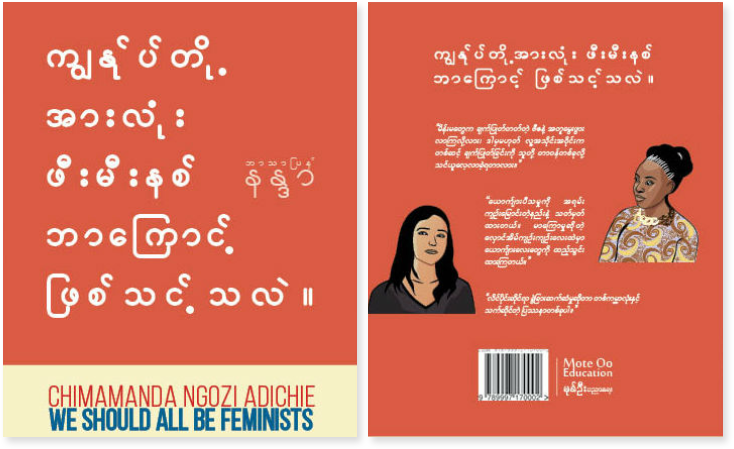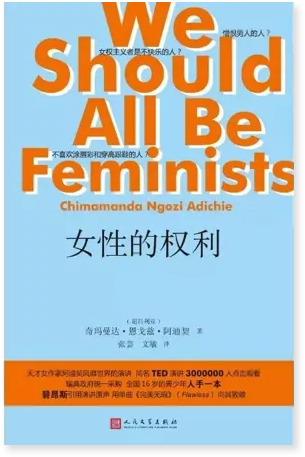Chimamanda Ngozi Adichie
Born 15 September 1977
“Some people ask: ‘Why the word feminist? Why not just say you are a believer in human rights, or something like that?’ Because that would be dishonest.” - Chimamanda Ngozi Adichie
Chimamanda Ngozi Adichie is a Nigerian born essayist and novelist living in New York. She has been wildly successful in changing the literary canon in Europe and North America, while at the same time redefining African literature. She describes herself as a “translated being”, employing her specific use of the English language in partnership with her transcultural writing style to create a voice for any “global citizen”. She takes the characters in her stories on transatlantic journeys, exploring movement between languages and cultural backgrounds to produce an expansive bibliography of work. Her novels and essays have been widely translated spreading her call to action that “We Should All Be Feminists”. We explore her novel, “We Should All Be Feminists”, as it is professionally translated into Burmese and Chinese.
-
Adichie’s “We Should All Be Feminists”, first published in 2014, will be translated for the first time into Burmese, by Nandar Gyawalli. The novel length essay was adapted by Adichie from her 2012 TED talk of the same name. In this essay, Adichie looks at the word “feminism” in all its rich historical complexity, and comes to the conclusion that the word “feminist” is not a negative word, but a term that should be embraced by all. Gyawalli’s translation took four months to complete, and found publishing through May Htut Pan Moe, the publications manager at Mote Oo Education. On the process of translating cross-cultural philosophy, Gyawalli writes, “It is quite frustrating when people, especially people you love and care about, don’t see these problems as problems,” she explained. “I was determined to translate it [We Should All Be Feminists] into Burmese language because I personally believe that this book will help many people to become aware of different forms of gender discrimination and think differently.”

-
Gyawalli says, “Before I decided to use the words “feminist” [and “feminism”], I talked with different authors and poets about the word.” She was unable to find a satisfactory Burmese equivalent for the word, and instead of making a literal translation, simply spelled out the word phonetically in Burmese characters.
Do You Need
Translation Services?Get your document translated by a professional translator for just within 12 hour delivery.
-
In the Chinese translation, the word “ feminist” has to be dropped from the title. The translation was released by the People’s Cultural Publishing House, and the title has been changed to “The Rights of Women”. The words “feminism” and “feminist” are increasingly problematic terms to all of us, but this is especially the case in China. The Chinese Communist Party is known for its pride in its record for dismantling patriarchal structures that put Chinese women at a historical disadvantage, however there have been high-profile censorship crackdowns on feminist activists and on feminist websites in recent years. This makes the Chinese translation of these terms problematic.
-
The issue with using the word is, said by the publisher, “not to involve the ideas that underpin feminism itself, but with the organizing potential of the cause.” Feminists in China are multi-level activists, often leveraging techniques of organization to intersect wider issues in civil society - such as classism or the labor movement. The publisher did not respond to this issue when asked for comments or an interview with the editor and translator. Adichie responds with this point in her book - “rights” are not enough. The essay is not a dull constitution retelling the do’s and don’ts of what to do or not do to a woman. The international success of the book lends itself to the universal call to change the way the word “feminism” is discussed
Arguably the most important aspect of Adichie’s work, is that she doesn’t limit feminism to women. She describes masculinity as a cage, and from an early age men are taught, perhaps forced, to limit or replace their experiences with emotions or actions deemed masculine. That is why “We Should All Be Feminists” is such an important book for the world and, specifically the professional translation community. It is the responsibility of the translator to effectively circulate revolutionary ideas that will create a better world for everyone.
Chimamanda Ngozi Adichie in numbers:
30 Number of languages Adichie’s work has been translated into.
22 Number of languages in which Adichie’s TED talk transcript, ''We Should All Be Feminists'' is available.
7 Number of completed novels and novel length essays: Purple Hibiscus, 2003; Half of a Yellow Sun, 2006; The Thing Around Your Neck, 2009; Americanah, 2013; We Should All Be Feminists, 2014; Dear Ijeawele, or A Feminist Manifesto in Fifteen Suggestions, 2017
19 Age when Adichie left Nigeria for the United States to study in Philadelphia. She has educational backgrounds in medicine, pharmacy, communications, and political science. Moving to the United States after growing up in Nigeria, she was not used to being defined by the color of her skin. Race, as it existed in the United States of America, became the navigation for her novel Americanah.
Watch Adichie’s “The Danger of a Single Story” TED talk.
An excerpt from Adichie's “We Should All Be Feminists” TED talk was sampled in Beyoncé's song "Flawless" in December 2013.
- “We teach girls to shrink themselves, to make themselves smaller. We say to girls, "You can have ambition but not too much. You should aim to be successful, but not too successful, otherwise, you will threaten the man.” Because I am female, I am expected to aspire to marriage. I am expected to make my life choices always keeping in mind that marriage is the most important. Now, marriage can be a source of joy and love and mutual support but why do we teach girls to aspire to marriage and we don't teach boys the same? We raise girls to each other as competitors not for jobs or for accomplishments, which I think can be a good thing, but for the attention of men. We teach girls that they cannot be sexual beings in the way that boys are. Feminist: the person who believes in the social, political, and economic equality of the sexes”
About This Article
Famous Translators is a MotaWord segment showcasing notable professional translated works and famous linguists from history to the present. We are researching, compiling and sharing stories that matter to every translator on our blog. You, too can be published right here on the MotaWord blog site - just contact info@motaword.com.
Check out our previous "Famous Translators" articles:
- Constance Garnett: The Imperfect Pioneer of Russian Translation
- The Graphic Translation of Persepolis
- Translating the Universe with Stephen Hawking
Citations: Degruyter, Coconuts, TheNewYorker, QZ
Get Free Translation Consultation From Our Team
Contact Us/f/84976/1113x932/bf963c6690/ekran-resmi-2023-06-29-21-25-21.png)




